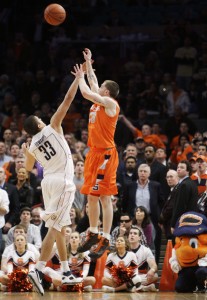By Campbell Burr
UJW
WASHINGTON — Aching legs, sweat, exhaustion. The University of Connecticut Huskies and the Syracuse University Orange men’s basketball teams battle in the sixth overtime, three hours and 46 minutes after tip off of the Big East Tournament quarterfinal in March.
At 1:22 a.m., Syracuse wins, ending the longest game in Big East Tournament history.
How did underdog, Syracuse, pull 10 points ahead at the end of the game? Some credit the team trainers. Others praise the coach. But few consider a backbone of the team: the nutritionist.

“Food becomes fuel,” said Michele Macedonio, the team dietician for the Cincinnati Bengals, the Cincinnati Reds and the Cincinnati Kings pro soccer team, which is why it is crucial for athletes to “prepare nutritionally.” The better the nutrition, the “more endurance, more power, more fuel,” Macedonio said.
Amy Wood, a former star on the No. 1-ranked University of Connecticut Field Hockey Team, a member of the Washington Shredders Hockey Club, a marathon runner, and a high school field hockey coach, agrees that good nutrition brings “more strength, more confidence, better play.”
Nutritionists stress the importance of a balanced diet, one that contains a variety of foods that each offer different vitamins.
Macedonio advises athletes to refrain from eating fried foods and urges them to keep a low fat diet, as fats slow digestion and can affect bowel movement. Wood also suggests that athletes avoid foods that are high in sugar, such as candy, as they can cause athletes to feel lethargic during competition.
The night before an event, nutritionists direct athletes to consume complex carbohydrates, such as whole wheat or white flowered pasta and bread, and a moderate amount of lean protein, such as chicken breasts and salmon. Macedonio said that carbohydrates are the “muscle-preferred fuel” and that lean proteins allow muscles to recover.
Michelle Szymzcak, captain of the Bethesda-Chevy Chase High School Varsity Swim Team, gathers with her team on nights before swim meets for “Pasta Dinners,” team potlucks with large servings of pasta, lasagna and bread. “I eat a lot of protein the week before (a meet) and carbohydrates the night before,” Szymzcak said.
The morning of an athletic event, it is important to choose foods that will leave the stomach and be absorbed into cells. Athletes should avoid foods that make them nauseous. Macedonio reiterates, “If food stays in the stomach, it doesn’t help you.”
Macedonio instructs athletes who get nervous before competing to eat liquid meals. Wood tells these athletes to eat bland foods and avoid heavy or spicy foods.
Athletes sometimes have the opportunity to eat during events. Macedonio recommends a high carbohydrate, easily digested snack, such as a pretzel with honey. She discourages athletes from consuming candy or sandwiches. Christine Brown, a member of Vanderbilt University’s golf team, usually eats a piece of fruit or a sports bar every few holes.
Even though heat usually brings down one’s appetite, nutritionists urge athletes to eat within the first hour after activity when muscles are most receptive. Sometimes liquid foods, such as kefir and yogurt smoothies, are desirable because they replenish fluid loss. Smoothies also offer carbohydrates and proteins.
Preparation differs for men and women because of their different body structures. Because women have less body mass, a menstrual cycle and lower iron stores, they may need more iron and calcium. Women also must keep body fat to a minimum.
According to Elise Sinagra, a dietician at Rockingham Memorial Hospital and an adjunct instructor at Washington and Lee University, men usually have to consume more calories.
Wrestlers prepare differently because they are under pressure to make a low weight class that allows them to compete against smaller athletes. During the season, Adam Pereira, a member of Bethesda-Chevy Chase High School’s varsity wrestling team, sticks to salad, fruit and protein bars and avoids unhealthy and salty foods, such as chips. Unlike the huge dinners that athletes normally consume the night before a match, Pereira sticks to water and a small meal. The morning of competition, he eats nothing. However, after weigh-in, he binges on sandwiches and fruits.
Hydration also is crucial to a strong performance. Website Strength-Conditioning.net said that if athletes wait until they are thirsty to drink water, it is too late. “You’ve already lost about 1 percent of your body fluids and, as a result, your physical performance will suffer significantly,” Strengh-Conditioning.net cautions.
On hot, humid days, Macedonio advises athletes to drink a sports drink two hours before competing. This helps athletes hydrate but will not make them have to relieve their bladders during competition. A half-hour before the game, athletes should drink more fluids.
Isotonic carbohydrate sports drinks, such as Gatorade and Powerade, replenish electrolytes, which are important to functions of the body. If an athlete is sweating out 2 percent of his or her body weight fluid, the athlete needs a sports drink to replenish lost electrolytes.
Brown, of Vanderbilt University’s golf team and a former cross-country runner for the school, preferred water before a race. However, afterwards, she drank Gatorade.
Szymzcak, the swimmer on Bethesda-Chevy Chase High School’s varsity team, avoids soda, alcohol and drinks with caffeine, which Strength-Conditioning.net warns all have “a dehydrating effect on the body.” However, Macedonio acknowledges that some runners like a cup of coffee before they exercise. Others have a bad response to caffeine and feel jittery.
Macedonio recommends that athletes test their levels of hydration during a low-level competition to ensure that they have prepared adequately. One method she suggests is weighing oneself before competing and again immediately after competing. The weight loss will equal the athlete’s fluid loss and can show the athlete whether he or she is hydrated.
A urine test is another method proposed by Macedonio. If an athlete’s urine is an apple juice color and very concentrated, the athlete needs more fluid. However, if the urine is lemonade-colored or clear and dilute, the athlete is hydrated. These tests are important because dehydration not only limits an athlete from performing at his or her full potential, but also risks heat illness, such as heat cramps, heat exhaustion and heatstroke.
Macedonio says that a balanced diet is essential for a strong performance. She helps football players prepare for NFL Pro Days by crafting personalized eating schedules. Once a football player did not follow her advice and had to quit the pro day early.
“Fatigue is caused by running out of fuel,” Macedonio said.


